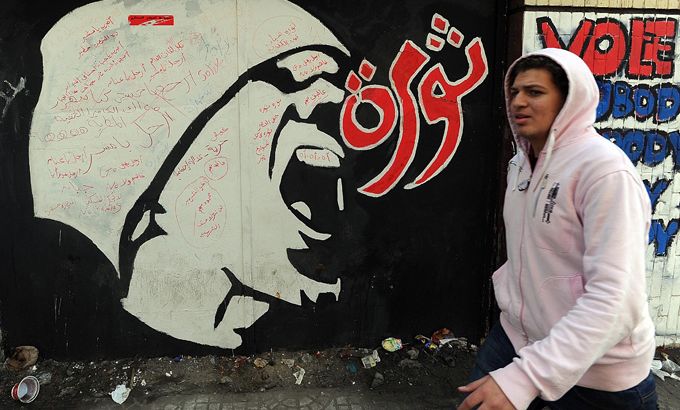
Manufacturing the truth
Egypt’s revolution was not televised – at least not on Egyptian state television, which preferred fabrication to truth.
Filmmaker: Sherif Saeed
On January 25, 2011, Egyptians took to the streets, beginning a march towards a revolution that would overthrow the regime of Hosni Mubarak, the Egyptian president.
But the revolution was not televised, at least not on Egyptian state television.
During the 18-day uprising, state TV portrayed the hundreds of thousands of protesters as a minority of troublemakers.
For many Egyptians, the building where the state media was headquartered had become a towering symbol of the regime they sought to overthrow.
For decades, the government-run media had provided a rosy picture of the president and his party.
Television is the main source of news in Egypt – a country with an illiteracy rate of 40 per cent. Yet many Egyptians felt much of what appeared on their TV screens was no more than fabrication and falsehood.
The revolution in Tunisia had unsettled the Egyptian regime, but the state media chose to downplay and even ignore it – mentioning the events there only after Zine El Abidine Ben Ali, the Tunisian president, had fled the country.
TV presenter Mahmoud Saad says there was not a single news item on state TV about what was happening in Tunisia: “They claimed Egypt was different from Tunisia and Mubarak was not like Ben Ali. After I finished reading the news with my colleague Mona El-Sharkawy, I mentioned the events in Tunisia. And I recited the famous line of poetry: ‘If the people want life, destiny will follow’.”
‘Calm on the streets of Cairo’
Within days, there were calls for a similar revolution in Egypt. It took just 18 days to bring down three decades of rule but during this time the state media disseminated a version of events very different from the reality on the ground.
Soha El-Nakash, a former presenter with Nile TV, says each bulletin started with the same headline: “Calm has been restored in the streets of Cairo.”
“I will never forget that headline. I felt I’d been used to lie to people,” El-Nakash says. “On 26 January I talked to the news editor before I read the 6pm bulletin. I begged him to change the content of the bulletin. He apologised and asked me to read the news as it was. I read the news and again said: ‘Calm has been restored in the streets of Cairo’. But the situation in Cairo was getting worse.” As state TV aired its own version of events, the state-owned print media also proved economical with the truth.
Ibrahim El-Sakhawy, of Al-Ahram newspaper, explains: “Important events were taking place in the country with thousands protesting. Yet the lead story of Al-Ahram newspaper was on Lebanon. It was a joke. We would go to Tahrir Square to see what was happening and then read something completely different in the newspapers …. There would be one million protesters in the streets. Yet the newspapers reported only a few thousand.”
When state TV did turn its attention to the protests, it focused on the looting and chaos of prison gates being thrown open and inmates released. There were also reports of mysterious foreign instigators.
Mobile phones vs. state media
Desperate to isolate the protesters from the rest of Egypt and the outside world, the Mubarak regime cut phone lines and shut down the internet. But internet access was eventually restored and dramatic footage of the protests were uploaded and viewed around the world – becoming iconic images of a revolution.
“The Egyptian state media had shamelessly and unprofessionally launched a campaign against the revolution,” explains journalist Wael Abd El-Fattah. “But the mobile phone has defeated the state TV building.”
With Mubarak’s grip on power increasingly challenged, all eyes turned to the TV screen when the president decided to speak to the nation. But as the people shouted for Mubarak to leave, state TV went on to broadcast flattering music videos of the president.
The common belief that much of Egypt’s media establishment was too close to the regime exacerbated the mood on the street.
With Mubarak’s resignation, state media suddenly found itself in situation of turmoil and uncertainty.
The regime may have fallen but the media apparatus which supported it remains. Whereas media commands used to come from the ministry of information, they now come almost exclusively from the military. And many feel that Egypt’s media has yet to undergo its own revolution.